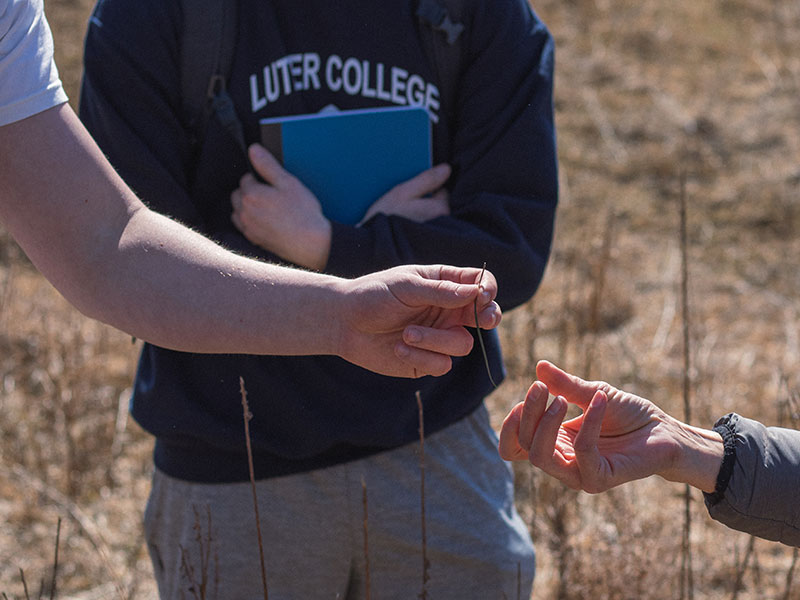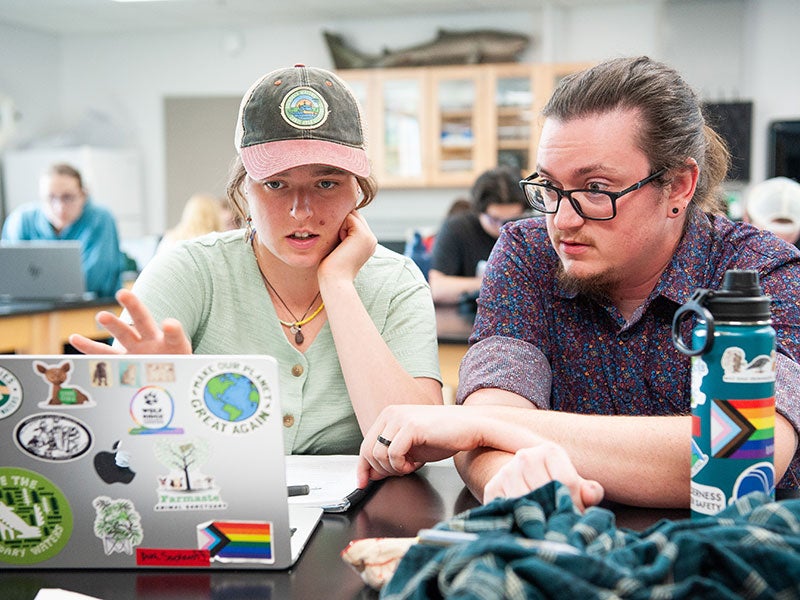Program Highlights
Sustainability
Get involved in sustainability! You can take part in ecological restoration events, join Luther’s student-led Environmental Concerns (ECO) club, and sign up for a plot in the community garden. You can also do work-study at Luther’s Center for Sustainable Communities. Sustainability is core to our mission. We consistently rank in the top tier of baccalaureate institutions for campus sustainability.
High-Impact Research
There are many opportunities at Luther to engage in research in environmental studies, usually in collaboration with faculty members. Summer student-faculty research projects have received support from organizations like the National Science Foundation and the US Environmental Protection Agency.
Off-Campus Opportunities
While you’ll learn a ton in Decorah, we also encourage you to learn in the wider world. Take part in one of our study-away programs focused on environmental studies. Intern off campus at places like the Iowa Natural Heritage Foundation, Iowa DNR, Upper Explorerland Planning Commission, the city of Decorah, Seed Savers, Nature Conservancy, or Winneshiek Energy District. We help you connect with so many opportunities to apply your studies to the real world!
What You’ll Learn
Core Courses
All students in the environmental studies major build a foundation through core courses in biology, philosophy, earth system science, environmental policy, and sustainability.
Areas of Specialization
Then, you can deepen your skills and find your own path by focusing on one of two different areas within environmental studies.
Major Plan One: Sustainability and Social Change
Starting in fall 2025, we are offering a new sustainability and social change focus area. If you are interested in community organizing and outreach, environmental justice, environmental policy and advocacy, sustainability planning, and environmental public service and governance, then this track is for you.
You will learn about many different approaches to understanding sustainability and leading social change. You can select from courses in anthropology, biology, economics, English, foreign cultures, history, and sociology. You can also take environmental studies courses on topics like Energy and Climate or Environmental Justice and Law.
Major Plan Two: Environmental Science
The study plan in environmental science delves into the many overlapping areas of scientific study required to understand, preserve, or restore an environment. If you are interested in natural resource conservation, ecological restoration, landscape architecture, environmental planning, and sustainable energy, then this track is for you.
You will take coursework in chemistry, biology, geology, and math to build your skills in the science of understanding environmental challenges and developing technical solutions. As of fall 2025, we are adding electives in geographic information systems, microbiology, and more.
Minors
Minors in environmental studies will expose you to basic concepts and skills, pairing well with many other majors offered at Luther.
Sustainability minor: Students completing this interdisciplinary minor will build skills and knowledge to advance sustainability and social change. If you are majoring in a field like international studies, management, or engineering sciences and want to gain experience in sustainability to complement your major, this is a great option for you.
Environmental studies minor: The environmental studies minor is our most interdisciplinary and integrated minor. Drawing from philosophy, political science, earth science, and biology, it provides students multiple lenses for understanding of environmental issues and tools for promoting positive environmental change.
Environmental science minor: This science minor is for students interested in focusing on the science of the environment. With coursework in areas like ecology, soil science, and climate, this minor can add an environmental focus to majors in other science disciplines or in engineering, and is also available to students with majors outside of the sciences.
Careers and Outcomes
A primary goal of the environmental studies program is to prepare you to enter the world, ready to take on a variety of environmental challenges. There are many career paths for people in environmental studies, including environmental education, policy and management, environmental science, and food systems. Our alumni are making an impact in careers across a broad range of organizations.
Career Fields
- Strategic communications
- Field research
- Public affairs
- Resource management
- Environmental specialist
- Logistics and project coordinator
- Conservation planning
Employers
- US Army Corps of Engineers Institute for Water Resources
- Illinois State Water Survey
- US Environmental Protection Agency
- Grand Teton National Park
- Iowa Soybean Association
- Iowa Department of Agriculture’s Mines and Minerals Bureau
- Green Iowa
- Nature Conservancy


Hands-On Restoration
Luther students get real-world experience working with a local landowner to restore biodiversity to land that has been formally been grazed and used for agriculture.
Volunteer Corps
Many environmental studies graduates spend a year or two volunteering with various organizations. These opportunities help develop your skills, build relationships, and discover new passions. They prepare you for success in graduate programs or careers, while also providing you the opportunity to give back to society. Each long-term volunteer opportunity is unique, so you can discover one that best matches your interests.
Past Luther graduates have volunteered with the following organizations:



